Kevin Clarke
Operetta Research Center
17 March, 2020
As the times of self-isolation continue, so does the catching up on old and new operetta releases that I’ve been meaning to listen to or watch for a long while. So, thanks to Corona, I finally managed to spend a full day with Offenbach’s Die schöne Lurette – of which there are two highly interesting DDR versions available on CD and DVD. They document how in Socialist post-WW2 Germany this last Offenbach operetta (1880) was celebrated as an example of working class people revolting against the aristocracy, in this case how the pretty laundress Lurette and her “beautiful launderette” Parisian colleagues at the times of Louis XV refuse to play along when the king wishes to “use” women as he pleases, as if they weren’t human beings with rights and feelings of their own.
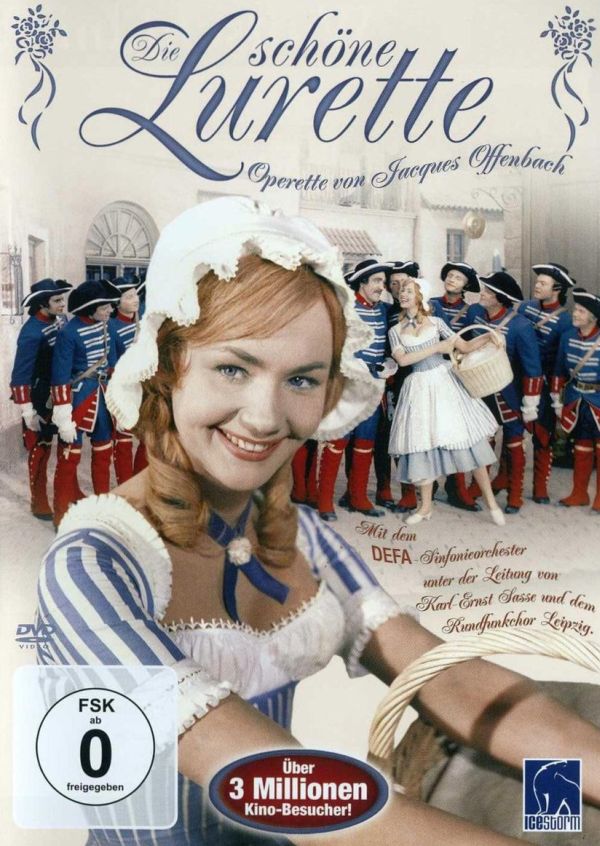
The DVD version of Offenbach’s “Die schöne Lurette,” with the 1960 DDR movie. (Photo: Icestorm.de)
Obviously, there are other working class operettas by Offenbach, among them the glorious Mesdames de la Halle (1858). But the cross-dressed market ladies in that early opérette-bouffe do not start a revolution, at least not against the aristocracy and the political regime itself. That’s what sets this last Offenbach show – labeled an opéra-comique – apart. The original French title Belle Lurette can also be read as “il y a belle lurette” which means “it’s a long time ago.”
Indeed, the piece written by Ernest Blum, Édouard Blau, and Raoul Toché for a production at the Théâtre de la Renaissance (where is premiered nearly a month after Offenbach’s death) is set in the 1760s. It depicts the world of Lurette and the other girls employed at the Parisian washing service of the elderly spinster Marceline. The girls flirt with the soldiers, whenever they get a chance. i.e. whenever Marceline is not looking their way. And Lurette is courted by three penniless artists: a singer, a painter, and a poet. She has to fend off many “indecent proposals” during work hours, when she brings the clean washing to the houses of the rich and powerful. But she’s an emancipated young lady and knows how to fend off advances she doesn’t want. Things get complicated, however, when she meets the Count of Marly. They are both attracted to one another, despite the huge difference in social position.
Mistress of Louis XV
What brings the revolt about is something else, however. The king wants a new playmate, to replace Madame Pompadour. So his top match-maker Malicorne is dispatched to order the Count to marry Lurette, which would turn her into a Countess that can be officially presented at court and then become the new mistress of the king, while Marly is to be sent off as ambassador to Turkey. (We recall a similar story from La Périchole.) To make Lurette agree to this wedding the Count is supposed to pretend it’s only a carneval wedding – that later turns out to be real, when Lurette can’t get out of it anymore.
When Lurette and the girls realize that they’ve been tricked they lash out. Refusing to play along. An act of unheard of disobedience!
It’s understandable that the young Socialist regime in East Germany was drawn to such a story.
Hella Janseen in the title role
In December 1958 they produced a German language radio recording that was broadcast in early 1959. This version with Hella Janseen in the title role has just been released, for the first time ever, on a double disc, as an extra it offers nine tracks from a 1965 French radio broadcast featuring Lina Dachary as Lurette and Michel Lamel as Le duc de Marly.
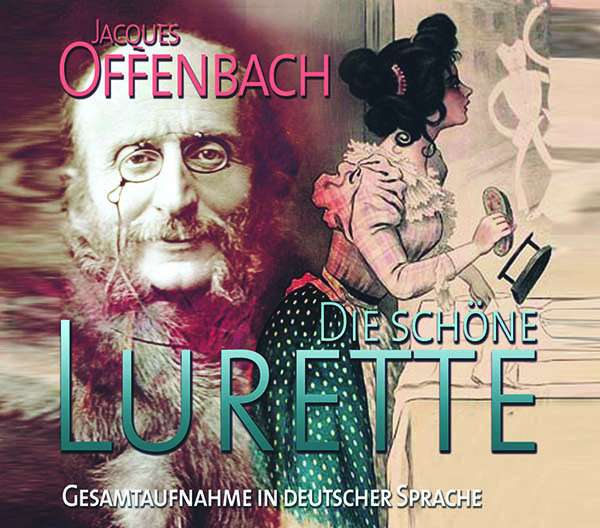
The 2019 CD release of Offenbach’s “Die schöne Lurette” with a recording from Leipzig, 1958. (Photo: Relief CD)
While the radio recording from Leipzig sticks close to the original, in which Lurette finds out in act 3 that the Count wanted to refuse the king’s orders and was prevented by force from doing so by wicked Malicorne, leading to her forgiving Marly and going away with him to Turkey as the new Countess, the DDR film of 1960 re-writes that ending.
In the film the story is adapted by Gerhard Schwalbe and Walter Zimmer. They add a fourth suitor to the Lurette story, carpenter Campistrel. When the laundresses climb onto the barricades at Marly’s big carnival party, and prevent his plans to introduce Lurette to the king as a Pompadour substitute – Marly had hoped, here, that this would translate into a big promotion for himself – Lurette turns to Campistrel for the happy end, leaving Marly and Malicorne to be laughed at and pushed into the gutter by the mob roaming the streets of Paris.
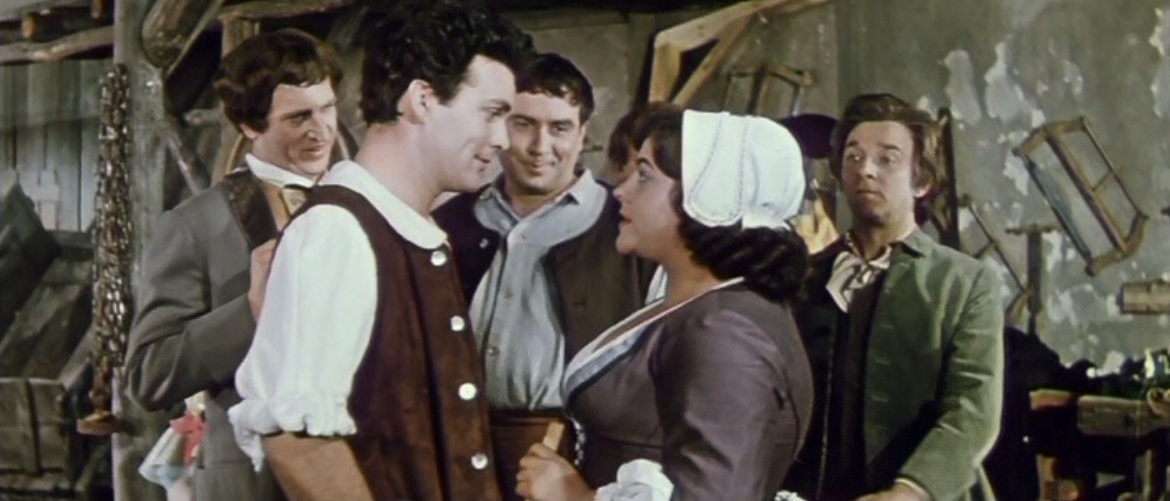
Campistrel (front l.) and Marceline in her beautiful laundrette, with the blue collar friends and admirers of Lurette. (Photo: Screenshot from the DEFA film version)
A real sense of camaraderie
The film cuts down the music substantially, even though there is a lot of singing. And nice singing, as a matter of fact. You get to hear the grand DEFA film orchestra conducted by Karl-Ernst Sasse with some snappy touch-ups to the orchestration. Those were not finished by Offenbach himself originally, in his place Delibes orchestrated the three act score. Which he did with great refinement, giving some lovely light touches to proceedings.
Evelyn Cron as the title heroine and Jirí Papez as Campistrel are a believable working class couple, and the blue collar world of Paris is nicely portrayed with earth-warm colors and a real sense of camaraderie. That’s also true for the sprinkle-clean laundresses and their employer, Marcelline (played by the outstanding Marianne Wünscher).
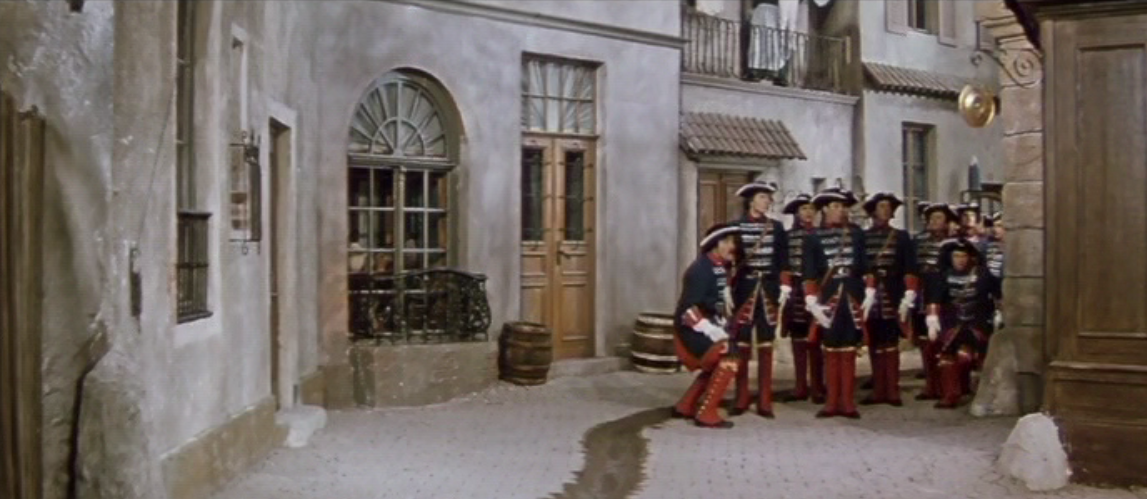
The soldiers looking for the lovely laundry ladies. (Photo: Screenshot from the 1960 DEFA film version)
The soldiers look somewhat idiotic when they march onto the scene in their blue-and-red uniforms, but it’s mostly about the contrast between the “natural” world of Lurette and Campistrel, and the stilted artificiality of Marly’s house where his dolled-up guests are living in a different realm of privilege and entitlement.
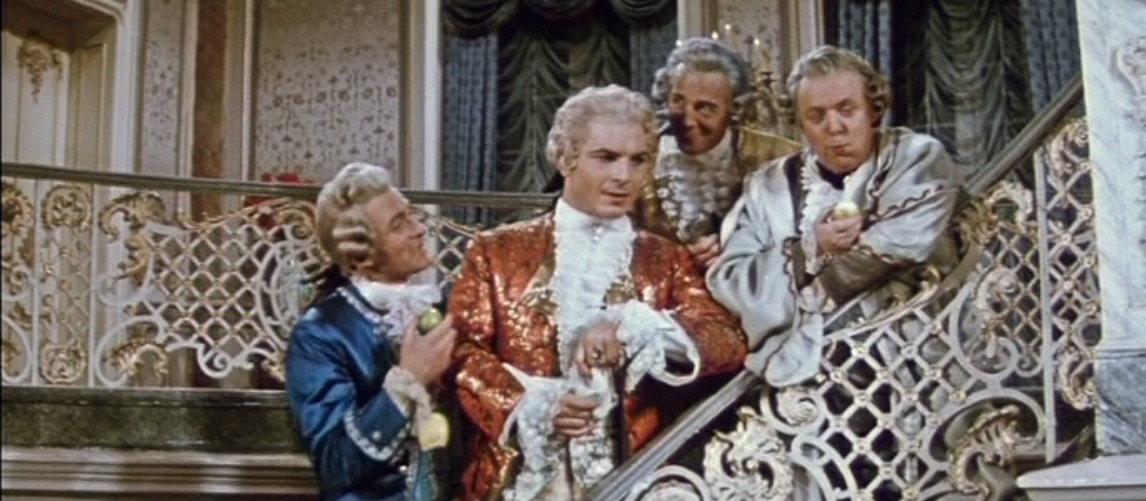
The world of the aristocracy in “Die schöne Lurette.” (Photo: Screenshot from the 1960 DEFA film version)
This DEFA production had more than 3 million visitors in East German cinemas, making it the most successful operetta film made in the DDR. Actually, it makes it one of the most successful DDR films, full stop. It’s more than just a historic document of a different and little known post-WW2 operetta tradition in the “other” half of Germany. It’s also a very charming film. And even if the “Socialist” happy ending simplifies the story substantially – to be more “educational” – it works with a straightforward message.
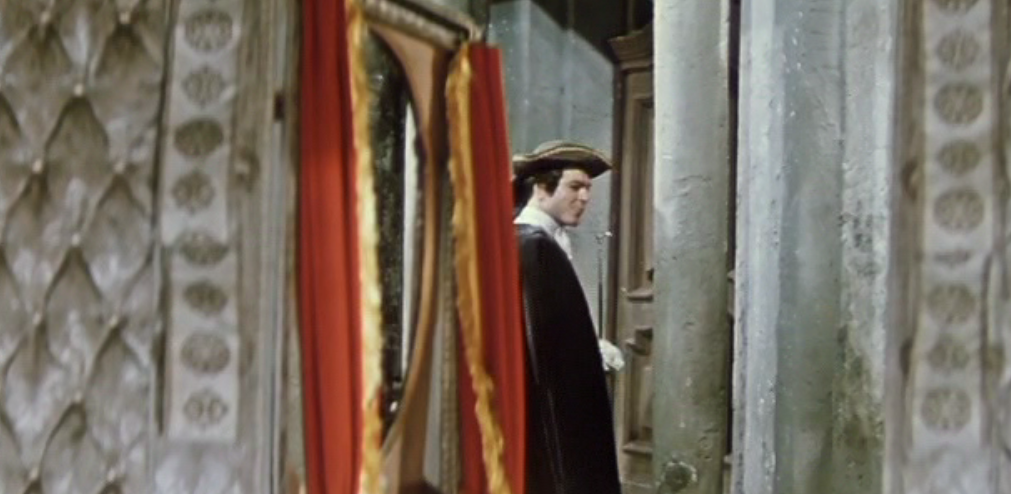
The seductive Count of Marly. (Photo: Screenshot from the 1960 DEFA film version)
Luckily, Otto Mellies as Count Marly isn’t too straightforward, which creates dramatic tension. Even if, all in all, the “dirty” side of the story is covered with a general fairytale harmlessness. (For example when Lurette is molested by one of her elderly clients … in these times of #metoo one could and should do more with such plot elements than simply let them slip by with a smile. Certainly if the aim of your movie is to empower and set an example leading to revolution. It seems the young DDR didn’t want too much revolution, an attitude that only got worse in later years, leading to the collaps of the entire system in 1989.)
Sweat and sex
In the movie, the big musical numbers come across splendidly. Yet, even though the action is set in a working class milieu, the singing and sound in general is anything but “working class.” There’s no roughness, no vulgarity, no sweat, no muscle. And the sex – even though the turning point of the plot – never ventures into dangerous territory.
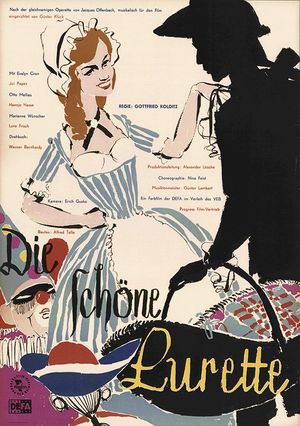
Poster for the 1960 DEFA movie “Die schöne Lurette.”
The same is true about the Leipzig radio broadcast, conducted by Gottfried Kassowitz. The CD editors decided to leave the original broadcast intact, meaning you hear the narration of the radio announcer throughout. He guides you through the story with an ironic twinkle in his voice, which is very becoming. And the story and music unfold with great ease, which includes the original ending in which Lurette decides to stay with Marly after she finds out that he really loves her and didn’t want to hurt her.
The music is magnificent. In every way. For someone who wrote this score on his death bed the sparkle and tunefulness of every number is remarkable. And I mean really remarkable. The chorus of the laundresses is one big splash and sonic foam party. The ensembles are built with masterful care. And Lurette’s big solos have a bounce that will knock you flat. (Try “Das Lied von Colette” and you’ll see what I mean. Here is the version from the movie soundtrack.)
The Blue Danube
There is a hilarious Johann Strauss parody, a duet in which Malicorne explains to Marceline (who turns out to be his ex-girlfriend from years ago) how his parents travelled around Europe and fell in love – on the river banks of the Blue Danube. Offenbach integrates the famous Strauss tune into his music in a way that makes me wonder why this number isn’t better known. It absolutely deserves attention. And it’s sung delightfully here by Lutz Jahoda as Malicorne. (With Jola Siegl as Marceline.) Here is a different, not quite as effective version of that duet:
Jahoda, by the way, plays the evil Malicorne as a man running around penning down every detail he notices, claiming to do so for “statistic” purposes. If you’re familiar with DDR politics you can tell that this is a reference to the notorious Stasi (the State Security) and their many “IMs” (“Inoffizielle Mitarbeiter,” i.e. inofficial co-workers) that spied on everyone, even their own families and friends. In East Germany, audiences up until 1989 were used to listen carefully for any critical subtext that referred to problematic political realities that could not be addressed openly. Jahoda manages this playing-with-subtext brilliantly.

The official logo of the DDR Staatssicherheit (“Stasi”).
On s’amuse, on applaudit
The other stand-out number is “On s’amuse, on applaudit” or “Man amüsiert sich und applaudiert.” You could call it Offenbach’s musical testament. He turns this into a final farewell that is heartfelt and touching beyond words. A moment of introspection and emotional quiet in the midst of a very turbulent score. (Here is a different recording of the song, not anywhere near as effective or personal as on the CD from Leipzig.)
Again, I wonder why that number is not included in every Offenbach concert and on every best-of Offenbach album. It’s a musical marvel, singled out by Jean-Claude Yon in his biography, too (if anyone gets to page 615!)
In the booklet, Matthias Käther explains that he had a bad home-made copy of this radio performance for years. In the course of the Offenbach celebrations of 2019 he wanted to play it in better sound quality in his own radio program. So he went to Leipzig to search for an original copy in the local radio archive. He found it, and that’s what you get here for the first time on CD.

Lurette enterting the stilted world of French aristocracy. (Photo: Screenshot from the 1960 DEFA film version of “Die schöne Lurette”)
There is no English translation of the libretto in the booklet, so unless you speak German fluently you might have trouble following the story. (Mr. Käther’s essay is translated into English, by the way.) But the piano score is available for free on the internet, in the original French version. So that helps. And it certainly helps to watch the DEFA movie first to get the basic plot outline, even if it has an alternative ending. (There are no English subtitles on the DVD issued by the company Icestorm.)

Campistrel and his friends hang Louis XV and Madame Pompadour as a carnival joke. (Photo: Screenshot from the 1960 DEFA film version of “Die schöne Lurette”)
A French alternative
Which might make you rush to get that Lina Dachary recording with Roger Albin conducting. He has a slightly more elegant way of handling Offenbach, with more esprit. And Miss Dachary absolutely has more “character” in her voice than either Hella Janssen or Ingeborg Wenglor, who is the ghost voice for Evelyn Cron in the movie. That said, Hella Janssen’s version of “Man ist amüsiert und applaudiert” has a sweetness and melancholy to it that is heartbreaking.
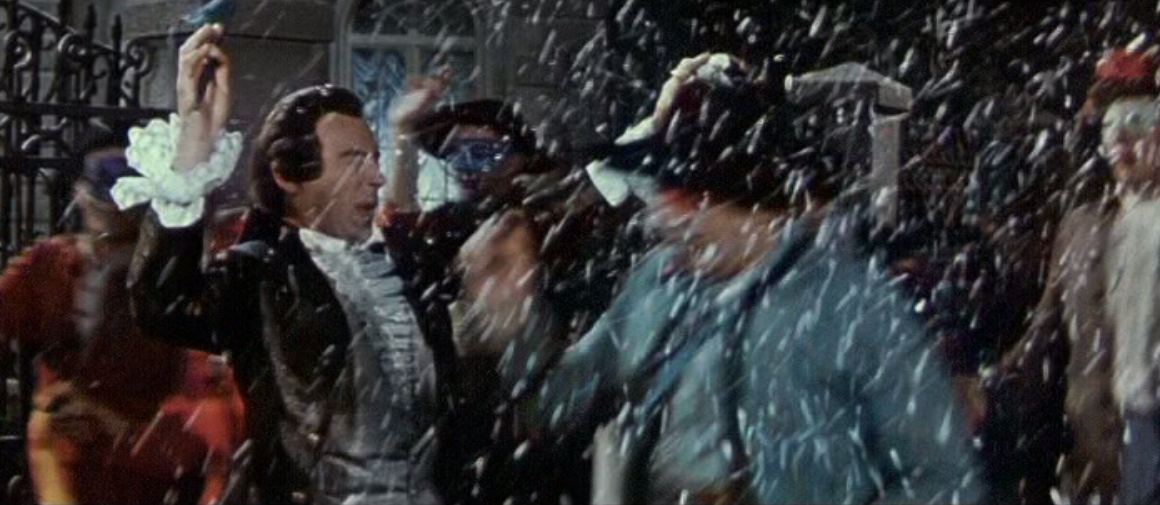
In the 1960 movie version Malicorne (l.) is pushed into the gutter by the mob. (Photo: Screenshot from the DEFA film)
A perfect musical testament, indeed!

The CDs are real gems- excellent- musically and technically- and they really fill a gap in the repertoire. Strongly recommended for any Offenbach enthusiasts, operetta lovers and collectors. Reading this excellent review I´m also highly motivated to see the DVD
It’s awesome to read this. I grew up with the DEFA movie and loved it. This operetta is very underrated and so little known. Even though it is wonderful and definitly worth listening to. I’m very happy that you reviewd it and that now more people can find out about this masterpiece of Offenbach and enjoy it.
Thank you for this excellent review! This makes keen on more rare Offenbach. My recommendation for an other funny erotic interpretation of the song The Blue Danube is the German version sung by Topsy Küppers. „Mein Vater war ein stiller Mann“ with chorus. https://rateyourmusic.com/release/album/ernst-gunther-scherzer-renate-holm-dagmar-koller-topsy-kuppers-oskar-czerwenka-waldemar-kmentt/die-schonsten-melodien-von-jaques-offenbach/
PS: She sings also „Wo ist der Degen von Papa?“ from Die Großherzogin von Gerolstein, only for adults ears!!!